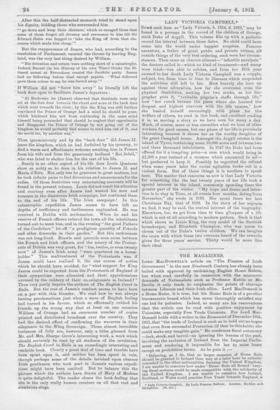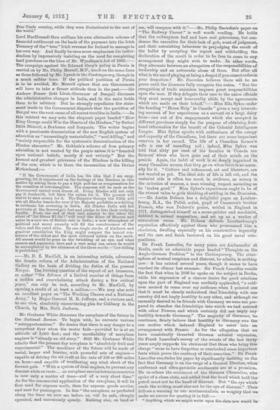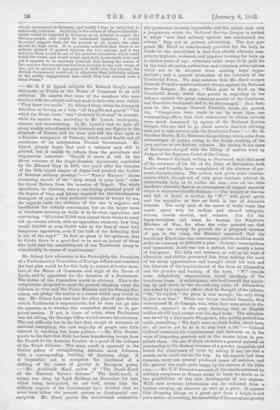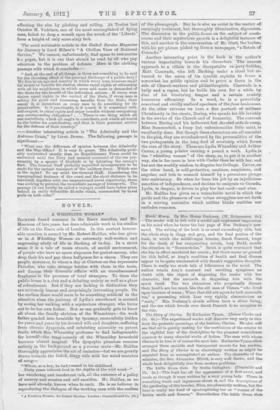THE MAGAZINES.
Loan MacDoNzaELL's article on "The Finance of Irish. Government " in the new Nineteenth. Century has already been hailed with approval by unthinking English Home Rulers,, but when read carefully in connexion with the minimum, demands of Nationalists such as Professor Kettle or Mr. Devlin it only tends to emphasize the points of cleavage.
between Liberals and their Irish allies. Lord MacDonnell is a Home Ruler, it is true, but his Home Rule is of a peculiaa bureaucratic brand which has never thoroughly satisfied any one but its patentee. Indeed, so many are his reservations that the article can be read with positive enjoyment by Unionists, especially Free Trade Unionists. For Lord Mac- Donnell holds with a writer in the Economist of December 16th, 1911,that "the trade of Ireland is such as to hold out no hopes that even from successful Protection (if that be thinkable) she could make any tangible gain." He condemns fiscal autonomy —lock, stock, and barrel—as ignoring the lessons of the peek involving the exclusion of Ireland from the Imperial Parlia- ment and rendering it impossible for her to raise loans. except on prohibitive terms. As he puts it :— "Believing, as I do, that no larger measure of Home Rule should be granted to Ireland than may at a later hour be suitably conceded to the other nationalities forming the United Kingdom, I am unable to conceive how under • Home Rule all Round' vary-. ing fiscal systems could be made compatible with the solidarity of the United Kingdom. I am unable to conceive how Ireland,, Scotland, or Wales could practise Free Trade towards England, * Lady Victoria Campbell. By Lady Frances Balfour. London: Hodder au& Stoughton. [Oa. net.] Free Trade country, while they were Protectionist to the rest of the world."
Lord MaeDonnell then outlines his own alternative scheme of financial settlement on the basis of the payment into the Irish Treasury of the " true "Irish revenue for Ireland to manage in her own way. And finally Leone° more emphasizes his indivi- dualism by impressively insisting on the need for completing land purchase on the lines of Mr. Wyndham's Act of 1903.— The campaign against Sir Edward Grey's policy in Persia is carried on by Mr. Philip Morrell, M.P., much on the same lines as those followed by Mr. Lynch in the Contemporary, though in a much milder tone. If the political partition of Persia is to be avoided, Mr. Morrell opines that our Government will have to take a firmer attitude than in the past.—Sir Andrew Fraser (late Lieut.-Governor of Bengal) discusses the administrative changes in India, and in the main holds them to be salutary. But ho strongly repudiates the state- ment made in the Government dispatch that the partition of Bengal was the root cause of all recent troubles in India.—In this context we may note the eloquent paper headed " How King George could Win the Hearts of the Hindoos," by Swfuni RUA Bhilrati, a Brahman and Sanyasin. The writer begins with a passionate denunciation of the new English system of education as "nauseatingly materialistic," "soul-killing," and "mainly responsible for the systematic demoralization of the Hindoo character." Mr. Gokhale's scheme of free primary education is not wanted by the people unless it is " founded upon national beliefs, mostly if not entirely." But the keenest and greatest grievance of the Hindoos is the killing of the cow, which is to them the incarnation of the Divine Motherhood If the Government of India has the idea that I am exag- gerating, lot it experiment on the feelings of tho Hindoos in this matter by asking thorn to pay a high poll-tax as compensation for the cessation of cow-slaughter. The response will be such as the Government cannot even dream of. Every Hindoo will not only pay it forthwith, but bless the rulers for it. The poorest will starve to save money for it. The Emperor George the Fifth will win all Hindoo hearts for ever if his Majesty prohibits cow-killing to celebrate his crowning in India. All Hindoo India will fall prostrate at the Sovereign's feet and pledge to him their undying loyalty. From ono end of that vast country to the other the shout of 'Jai Sircar KJ Jai !* will rend the dome of Heaven and usher in a new era of British rule in India ; a now atmosphere of political and moral serenity will fill the consciousness of the rulers and the ruled alike. By one single stroke of kindness and gracious conciliation the King might conquer the inmost con- science of the oldest and the most cultured nation on the earth. All unrest would be gone in the twinkling of an eye, and what cannon and repressive laws and a vast army can never de would bo accomplished by the utterance of the three words= Cow-killing is prohibited.' " —Mr. D. S. MacColl, in an interesting article, advocates the drastic reform of the Administration of the National Gallery on the basis of dividing the duties of the present Keeper. The burning question of the export of art treasures, or rather "the defence of a limited number of things from a sudden and overwhelming attack during a few critical years," can only be met, according to Mr. MacColl, by opening a credit of at least a million.—We may also note an excellent paper on "The Working Classes and a National Army," by Major-General H. B. Jeffreys, and a curious and, to our view, absolutely unconvincing plea for Celibacy in the Church, by Mrs. Huth Jackson.
Mr. Grahame White discusses the aeroplane of the future in the National Review. To begin with, he corrects various " misapprehensions." He denies that there is any danger to a competent flyer when his motor fails—provided he is at an altitude of 2,000 feet ; and the unreliability of aeroplane engines is "already an old story." Still Mr. Grahame White admits that the present-day aeroplane is "absolutely frail and experimental." The machines of the future will bo made of metal, larger and heavier, with powerful sets of engines— capable of driving the air craft at the rate of 150 or 200 miles an hour—and capable of weathering any wind short of the fiercest gale. " With a system of dual engines, to prevent any descent while en route . . . an aeroplane service between countries is now only a matter of time—and of a very short time." As for the commercial application of the aeroplane, it will be first used for express mails, then for express goods service, and next for passengers. In fine " the aeroplane, as perfected along the lines we now see before us, will be safe, cheaply operated, and enormously speedy. Nothing else, on land or sea, will compare with it."—Mr. Philip Snowden's paper on "The Railway Unrest " is well worth reading. He holds. that the railwaymen had and have real grievances, but con- demns the executive for their lack of grit, want of judgment, and their astonishing behaviour in prejudging the result of the ballot by accepting the report and withholding the declaration of the result in order to be free to come to any arrangement they might wish to make. In other words, they alternate between an abnegation of the responsibilities of leadership and an autocratic abuse of them. But after all what is the use of playing at being a despot if you cannot enforce, your despotism P Mr. Snowden believes there will be no peace until the directors fully recognize the union. " But the recognition of trade unionism imposes great responsibilities. upon the men. If they delegate their case to the union officials they must accept and honourably abide by the agreements which are made on their behalf."—Miss Ella Sykes under the heading " ' Home Help' in Canada" gives a very interest- ing account of her experiences as a servant on a large dairy farm—one out of five engagements which she accepted in. different provinces simply for the purpose of obtaining first- hand information for the benefit of the Colonial Intelligence League. Miss Sykes speaks with enthusiasm of the energy and capacity of the Canadians, but there are some important reserves in her record. The life of a Canadian farmer's wife is one of unending toil ; indeed, Miss Sykes was told that sixty per cent. of the lunatics in Canada are farmers' wives who have gone out of their minds on the prairie. Again, the habit of work is so deeply ingrained in many Canadian women that they go on when there is no neces- sity for it. "Culture and refinement, art and literature, are not wanted as yet. The ideal side of life is left out, and the material side is often too much in evidence, as money is the criterion of success, a man winning respect according as he ' makes good.' " Miss Sykes's experiences ought to be of the utmost value to girls thinking of settling in the Dominion.
Mi. Austin Dobson has a delightful paper on Louther- bourg, R.A., the Polish artist, pupil of Casanova's brother Francis, who won Diderot's praise, settled in England in 1771, distinguished himself as a scene-painter and machinist,, dabbled in animal magnetism, and set up as a worker of miraculous cures. Mr. Dobson defends Loutherbourg's reputation effectively against those who pronounced him a. charlatan, dwelling especially on his constructive ingenuity and the care and finish bestowed on his great naval com- positions.
Sir Frank Lascelles, for many years our Ambassador at Berlin, sends an admirable paper headed " Thoughts on the Anglo-German Problem" to the Contemporary. The atmo- sphere of mutual suspicion and distrust., he admits, is nothing new : it has existed several years, though it seems to have reached its climax last summer. Sir Frank Lascelles recalls the fact that when in 1906 he spoke on the subject in Berlin, while his expression of a sincere desire for good relations upon the part of England was cordially applauded, "a cold- ness seemed to come over my audience _when I pointed out that it must be clearly understood that friendship with one country did not imply hostility to any other, and although we earnestly desired to be friends with Germany we were not pre- pared to abandon the friendships into which we had entered with other Powers, and which certainly did not imply any hostility towards Germany." The majority of Germans, he continues, firmly believe that hostility to Germany was the one motive which induced England to enter into an arrangement with France. As for the allegation that we have consistently thwarted German colonial expansion, Sir Frank Laseellea's survey of the events of the last thirty years amply supports his statement that those who bring this charge " seem to have forgotten or overlooked some important facts which prove the contrary of their assertion." Sir Frank Lascelles concludes his paper by significantly insisting on the fact that Germany is on the verge of a General Election, when exuberant and ultra-patriotic sentiments are at a premium. He re-echoes the sentiment of the German Chancellor, who spoke of a clean slate, and added that the hand which held the pencil must not he the hand of distrust. But "the eye which reads the writing must also not he the eye of distrust." Then. follows a warning to our sentimentalists, so weighty that we make no excuse for quoting it in full :- "Anything which we might write upon the slate now would be closely scrutinized in Germany, and would, I fear, be subjected to unfriendly criticism. Anything in the nature of effusive blandish- ments would be regarded in Germany as an attempt to cajole the German people, and would bo considered insincere. I would therefore suggest that, for the present at all events, the slate should be kept clean. It is generally admitted that there is no definite ground of quarrel between the two nations, and a war between them would be one of the greatest calamities which could befall the world, and would entail upon both incalculable loss ; and yet it appears to be seriously believed that during the course of last summer the two nations had been brought to the very verge of war, not on account of any quarrel of their own, but because the British Government could not do otherwise than faithfully adhere to the public engagements into which they had entered with a third Power."
—Mr. H. F. B. Lynch subjects Sir Edward Grey's recent statement on Persia in the House of Commons to an acid criticism. Ho asserts that none of the members who were familiar with the subject and had made it their own were called. "They know too much." Sir Edward Grey, whom he strangely describes as having, as a rule, "all the gifts and graces" "for which the House looks," was "obviously ill at ease" in manner, while his matter was, according to Mr. Lynch, inadequate, obscure, and unconvincing. In Mr. Lynch's view we have all along weakly subordinated our interests and our dignity to the demands of Russia, and we have now left the door open to a Russian occupation of Teheran, which would finally end all semblance of an independent Persian Government. Mr. Lynch piously hopes that such a calamity may still be averted, but is unable to refrain from the gratuitous and ungenerous comment : "Should it occur it will be the direct outcome of the Anglo-Russian Agreement, concluded by Sir Edward Grey in 1907, two years after the victories of the little island empire of Japan had pricked the bubble of Russian military prestige."—" Master Mariner" draws reassuring morals of the " sleep sound in your beds " order for Great Britain from the invasion of Tripoli. The whole operations, he observes, were a convincing practical proof of the degree of time and labour required for the simultaneous transport of even a very moderate number of troops by sea. As regards raids the evidence of the war is negative and insufficient for definite conclusions, but on the larger issue of wholesale invasion he holds it to be clear, opportune, and convincing. "If it takes 35,000 men almost three weeks to carry out an oversee attack, with no opposition whatever, how long would 200,000 or even 70,000 take in the face of some very dangerous opposition, even if the bulk of the defending fleet is out of the way P " In fact so great is his optithism that he thinks there is a good deal to he said on behalf of those who hold that the establishment of our Territorial Army is considerably in excess of requirementsl Mr. Sidney Low advocates in the Fortnightly the formation of a Parliamentary Committee of Foreign Affairs and considers the best plan would be for this body to consist of twelve mem- bers of the House of Commons and eight of the House of Lords, and be appointed for the duration of a Parliament.
The duties of the Committee would be advisory. This is the compromise proposed to meet the present situation when the Cabinet, or even only the Prime Minister and the Foreign Sec- retary, can pledge the nation to a course which may result in war. Mr. Sidney Low sees that the other plan of open discus- sion in Parliament is impracticable, but he does not go into the question as to whether this committee should be in per- petual session. If not, in times of crisis, when Parliament was not sitting, the Foreign Office would resume its autocracy. The real difficulty lies in the fact that, except at moments of national emergency, the vast majority of people take little interest in anything but home politics.—Mr. Ellis Barker points to the fact that Italy bas been transferring troops from the French to the Austrian frontier as a proof of the collapse of the Triple Alliance. The same result is apparent in the Italian policy of strengthening Adriatic naval defences, with a corresponding building of Austrian ships. It is impossible not to recognize the likelihood of a shifting of the centre of gravity in European power. —Mr. Archibald Hurd writes of " The Death-Knell of the National Service Scheme." The death-knell, it seems, was rung by Lord Haldane on December 1st last, which being interpreted, we are told, means that the military experts of the Government have decided that we must have either the present system or Continental con- scription. Mr. Hurd quotes the accustomed authorities who pronounce invasion impossible, and the article ends with a programme which the National Service League is invited to adopt " now that military opinion has condemned the scheme " they are at present advocating. The new pro. posals Mr. Hurd so considerately provides for the body he thinks he has demolished is that they should advocate com- pulsory hygienic, technical, and physical training for boys up to sixteen years of age ; voluntary cadet corps to be paid for by the local education authorities and voluntary subscriptions which are to be diverted from existing boys' organ- izations ; and a general promotion of the interests of the Territorial Force. We may mention that Mr. Hurd accepts General French's unsubstantiated charge against the National Service League. He says : " Their gaze is fixed on the Territorial Army, which they persist in regarding as our defence against the great conscript armies of the Continent, and therefore inadequate and to be discouraged." In a foot- note to this passage General French's words are quoted, viz., " Complaints were made to me by more than one commanding officer that their endeavours to obtain recruits were much hampered by agents of the National Service League, who are said to go about certain districts advising men not to take service with the Territorial Force."—Mr. H. Gardner Burke, K.O., discusses the problems which arise from miscarriages of justice owing to the faulty working of the jury system in our African colonies. He desires to see cases of Europeans charged with the killing of natives tried by Judges of the Supreme Court of the Colony.
Mr. Bernard Holland, writing in Blaclwood, says that most of the reviewers of his life of the Duko of Devonshire, both hostile and friendly, have complained of the absence of per- sonal characteristics. The author now gives some reminis- cences which, though not of very great intrinsic interest, do undoubtedly help us to realize the man ; over all the little incidents recorded there is an atmosphere of dogged sincerity which is characteristically distinct. —The history of the rise and fall of Arb,bi is written by " W." with great spirit, and the narrative as here set forth is one of dramatis interest. The early part of the career of Art‘bi reads like comic opera with its endless and absurd intrigues, arrests, courts martial, and releases. Nor did the topsy-turvydom end when he became the Khedive's Minister of War, for when the ruler pointed out that there was no money to provide for a proposed increase of pay to the army, the Minister answered that the hereditary Khediviate was unneoessary,a.nd its abolition would make an economy of £300,000 a year. Corrupt, unscrupulous, and tyrannical, Arabi was not a patriot, but merely a hater of foreigners. His folly and rashness, as well as his want of education and ability, prevented him from making the most of his many opportunities and brought about his ruin and the disasters of the bombardment of the forts at Alexandria and the plunder and burning of the town. " W." records some delightfully characteristic naval incidents of the troublous times.. A midshipman, who had been all day march- ing up and down in the smouldering ruins of Alexandria, was asked by a superior officer what he thought of the inferno. " Oh," he replied, " the place is nice enough ; the only thing is, jam, is so dear." When our troops reached Ismailia they encountered M. de Lesseps, who, when they were about to dis- embark, appeared on the quay, declaring that no English soldier should land except over his dead body. The situation was saved by a diplomatic Bluejacket, who quietly pushed him aside, remarking, " We don't want no dead bodies about here, sir; all you've got to do is to step back a bit."—Colonel Callwell continues his reminiscences and instructs us in the ways of inspecting generals and in the means taken to pro- pitiate them. On one of these occasions a general insisted on penetrating to the darkest recesses of a powder magazine, and tested the observance of rules by asking if any one had a match, as he could not see his way. As the request had been foreseen, every one present produced boxes of matches, and the general was made quite happy by the success of his little ruse.—Mr. T. F. Farman's account of the results achieved by military aeroplanes in France seems to leave no doubt as to the possibilities of this new development of war engines. With ease accurate information can be collected from a biplane carrying an observer as well as a pilot. It appears that dropping things on a given spot from a height is not yet a matter of certainty, the instability of the aeroplane greatly
affecting the aim by pitching and rolling. At Toulon last October M. Vedrines, one of the most accomplished of flying men, failed to drop a wreath upon the wreck of the Libert6 from a height of only some sixty feet.
The most noticeable article in the United Service Magazine for January is Lord Milner's "A Civilian View of National Service." We cannot, unfortunately, find space to summarize h's paper, but it is one that should be read by all who pay attention to the problem of defence. Here is the striking passage with which it concludes:-
" And, at the end of all things, is there not something to be said for the elevating effect of the personal discharge of a public duty ? We live in an age and country in which every man, however small his means or humble his station, claims equal rights of citizenship with all his neighbours, in which more and more is demanded of the State for the benefit of the individual citizen. If every man claims equal rights in the control of the State, if every man is asking for great and increasing benefits from the State, then surely it is incumbent on every man to do something for its preservation. Is it practicable, is it sound, is it consistent with self-respect, to claim rights and enjoy benefits without recognizing any corresponding obligation P . . . There is one thing which all can contribute, which all ought to contribute, and which all would be the better for contributing, and that is their personal service for the defence of their country."
—Another interesting article is "The Admiralty and the Autumn Crisis," by Lieut. Dewar. The following passage is significant :—
" What was the difference of opinion between the Admiralty and the War Office ? It is easy to guess. The Admiralty prob- ably maintained stoutly that no Expeditionary Force could be embarked until the Navy had secured command of the sea pre- sumably by a species of blockade or by defeating the enemy's fleet. The General Staff probably requested arrangements to be made for the instant transport of the military force. Which was in the right P To my mind the General Staff. Considering the topographical features of the coast and the short distance to be traversed, together with our unquestioned naval superiority, there was nothing to prevent the immediate passage of transports. Tho passage (it can hardly be called a voyage) would have taken place behind an easily defensible 21-mile strait, commanded by naval ports on both sides."





















































 Previous page
Previous page